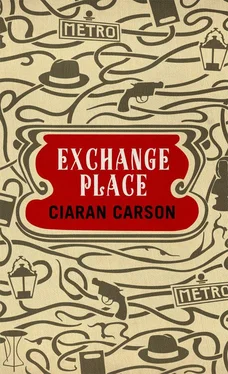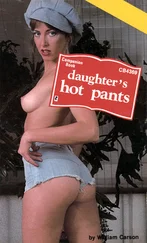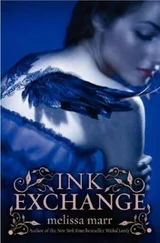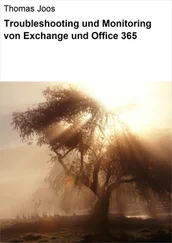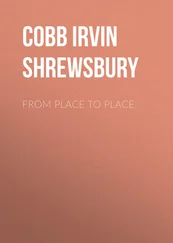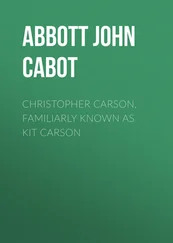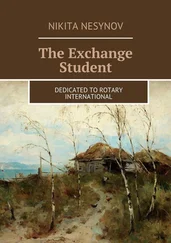Kilpatrick had not been aware of the vehicle’s stopping. The passenger door opened seemingly by itself. Odilon the chauffeur was poised at its side when they disembarked. As they did so Kilpatrick saw one of those massive oak-doored portals you come across in certain streets in Paris. Odilon retired to the limousine. Gordon went up to the portal and pressed a button on the intercom. It gave off a noise as if of short-wave radio. Gordon spoke into the speaker.
The doorbell rang. I went to the front door. It was the postman. He gave me an armful of post. Three days’ backlog addressed to John Kilfeather, 41 Elsinore Gardens, Belfast BT15 3FB, whether Northern Ireland or UK: letters, junk mail, packages. It was the morning after the day of my return to my dwelling place. Some show, said the postman, gesturing with a nod of his head to the street behind him. Three figures in white coveralls were shuffling at a snail’s pace down the pavement on this side of the road, three others on the other, holding long white wands in front of them like blind men, one or other of them stooping from time to time to examine the ground in greater detail, sometimes picking up something invisible to me and either discarding it, or depositing it in a plastic bag; and I supposed they must be blind indeed to anything beyond their immediate field of vision, a matter of a square yard or so at a time, so concentrated did they seem on their task. I nodded back at the postman. In the time it took me to sign for some packages, bid the postman good-day, and turn to go back into the house, the figures in white coveralls had barely moved from where they had been. I took the post into the front room and took a Stanley knife to the three packages. I knew they were books. One bore the sender’s name, Tgl Harmattan 2, Paris. This would be the Cocteau, Tour du monde en 80 jours . I couldn’t remember what the others might be; I order many books online. As it turned out, one was Three British Screenplays , edited by Roger Manvell and published by Methuen of London in 1950. The screenplays were of Brief Encounter, Odd Man Out , and Scott of the Antarctic . I had ordered it for Odd Man Out , but the other titles were not without interest. I opened the book and found the first page of Odd Man Out . I rolled a cigarette.
This is what I read:
1. Passenger ’plane. A scene from a passenger ’plane which is above cloudbanks. The clouds drift past, and as the ’plane banks and then dives, the scene is momentarily obscured, until we catch a glimpse of a large city in a gap between the wisping clouds. Sunlight shines through the clouds which thin and finally disappear, revealing the great scene below, with mountains surrounding the city. We dive swiftly down and approach towers, smoke stacks, tall steeples and see everything in sharper definition. Then into view there comes a busy main street with traffic and pedestrians moving below, gazing into shop-windows. Dissolve to
I lit the cigarette, as I thought of it. As I smoked, the fog of memory cleared and I remembered the flying dreams of my childhood, when I would soar and swoop over Belfast, diving swiftly down and gliding along Royal Avenue at rooftop height, then just above head height. It is 1950-something, and I float above a bobbing sea of hats and caps. I am invisible to the crowds that throng the street, walking purposefully or aimlessly or gazing into shop windows and I do not know whether I am remembering a dream or daydreaming in the here and now, making it up as I go along. I take another draw of the roll-up and pause to hover at the window of Burton’s the Tailor, admiring the three-piece navy herringbone suit displayed on a headless mannequin. Three buttons, narrow lapels, narrow trouser cuffs, it must be the late 1960s now. Gone for a Burton, as in dead, the suit you are laid out in when your time comes. I know that Burton’s, where I got my first proper suit, is long since gone. So is the suit, into what oubliette I do not know. I’m daydreaming now, remembering. I’m coming on eighteen. This will be a birthday suit, so to speak. My father is standing outside the cubicle where I am being measured behind the drawn curtain: chest, shoulders, arms, waist, leg, the tailor deploying his tape with practised ease, jotting down my details in a notebook. I am in his book now, the suit already beginning to take shape in his mind’s eye.
I feel slightly stoned. I lay the book on the desk and see a rolled cigarette beside it. I realize I am stoned. Only now do I get the scent of the Black Rose. Now I remember I’d rolled a joint just before my forced evacuation, and left it lying on the desk in my distraction. I am smoking a joint not the cigarette I’ve just rolled. I put it down to a happy accident. I’m beginning to see everything in sharper definition. I flick through the screenplay at random. Facing page 96 is a black and white still, captioned ‘SCENE 156: Shell realizes that Johnny is hidden in the Bar of the Four Winds’. Of course. The Four Winds. I remember that John Buchan, author of The Thirty-Nine Steps , made into a film by Alfred Hitchcock, also wrote The House of the Four Winds , a book I’ve never read, and I wonder if Carol Reed had it in mind when he renamed the Crown Bar. I think of the four points of the compass, and then of the Morning Star, whose sign is a compass rose or star, and again I remember that October afternoon which seems a life ago, the thunderstorm, and rain spattering the pages of the missing notebook.
I look at the still. The character known as Shell, attired in shabby overcoat, scarf and bowler hat, is in the immediate foreground, glancing suspiciously to his right at something or someone out of shot. There are some twenty other men in the bar, many of them wearing hats or flat caps. Four of them, wearing white mackintoshes, look like detectives but are most likely not. It’s just what men wore back then, in 1947. Behind the bar is the chief barman, played by William Hartnell, who later went on to play the first Doctor Who. What was his name? Fencie, that was it. Implication of illicit dealings. The fence who sells on stolen goods, which are under defence of secrecy. As I write I hear the menacing bass throb of the Dr Who theme reverberating in my memory. I’m writing this directly on to the computer now, having strayed somewhat from the notebook entry I’d made previously, what I had in mind to write. So I look up the theme tune on the net.
The tune was composed by Ron Grainer and realized by Delia Derbyshire at the BBC Radiophonic Workshop in 1963. Grainer’s score, written on a single A4 sheet of paper, was basic: essentially, just the famous bass line and the swooping melody, with simple indications for timbre and orchestration: ‘wind bubble’, ‘cloud’, and so on. Derbyshire’s job was to put electronic flesh on the bare bones. No synthesizers existed then: the music was pieced together by hand-splicing tape loops of an individually struck piano string — duh-duh-de-dum, duh-duh-de-dum — and sounds from an array of oscillators and filters used to test electronic equipment. A white noise generator provided the hissing sounds as well as the ‘bubbles’ and ‘clouds’. I click on Grainer’s name and discover he also wrote the theme to the 1960s Maigret TV series. French accordion music evoking bistros, cafés, cobbled streets glistening under lamplight. In my mind’s eye I saw the opening titles, the black Citroën police car driving through the rainy darkness, windscreen wipers ticking metronomically; and I entered a fictional Paris.
The intercom gave off a noise as if of short-wave radio. The words that emerged from it were unintelligible to Kilpatrick. Gordon said some words in reply. There was a click, and Gordon opened the postern gate. They walked through a vaulted entrance into a courtyard. The fog had gone. A full moon hung in the sky and a fountain played in the moonlight. They walked through the courtyard into a stone-flagged arcade lined with statuary, mythological figures whose blank eyes seemed to follow Kilpatrick as he passed them, or else he felt them boring into the back of his head. You know the way you know someone’s looking at you, he thought, you can feel the gaze, and you turn to look at them, but by this time their eyes have turned away. Gordon and Kilpatrick walked to the end of the arcade, shoes clacking on the stone flags. They came to a door and another intercom. Again the same procedure. The door opened. They entered. They found themselves in a dark vestibule. Watch your step, said Gordon. They descended a steep stone staircase into a cellar space. Strange, ethereal music was playing. Under a series of arches along one wall were alcoves lit by art deco scallop-shell wall lamps. Interlocutors leaned towards each other over the tables, holding a drink in one hand and a cigarette in the other. Kilpatrick could make nothing of their murmuring. He recalled how often he had sat in other bars, overhearing snippets of talk drifting in and out of the buzz, trying to guess or make up whatever story lay behind this stray phrase or that, disembodied from whatever context, words like enigmatic messages emanating from a badly-tuned short-wave radio awash with static. Sometimes he would scrawl what he had heard in a notebook. Sometimes when he looked at it again in the light of day he would find his own writing indecipherable, or else he could not think of the significance of the words and why he had written them.
Читать дальше
